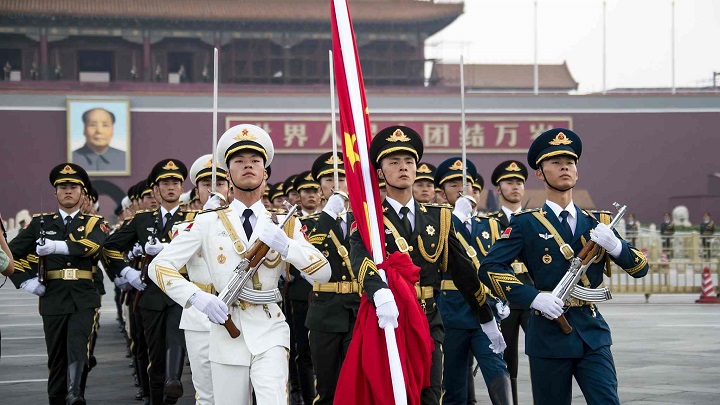
As China is celebrating its Army Day on August 1, the children of Sunzi, the strategist of victory without a fight, know there is something better than guns for national defence. Or they ought to know. China needs friends, people and countries who will stand for China’s universal values, as they stood in the past century for the values of the Soviet Union or the United States.
The USSR narrative was of liberation from capitalist oppression. The American narrative is about freedom and liberty. These values lead to a lot of mistakes but they are part of the quest for freedom. These narratives are not “the truth” but they have a drive — a global appeal that goes beyond the single country.
What is China’s narrative? China wants to make life better for the Chinese, fine, and then what about other countries? Will China be the dominant power in a constellation of lesser countries in the world?
One can argue that the US is like that, and so it was for the USSR. But America is a country of immigrants, where anybody can have a chance, even the son of an African, like Barack Obama, or refugees from Germany like Henry Kissinger and Poland like Zbigniew Brzezinski, who have shaped US foreign policy for decades.
Something similar happened in the USSR, which was ruled with an iron fist by a Georgian for whom Russian was a second language.
But China is not a country of immigrants, and the Chinese communist revolution was not so much about egalitarianism as about national vindication against Japanese occupation, Western semi-colonialism, and even centuries of Manchu rule over a lesser Han majority.
In fact, “Han” was during three centuries of Qing rule a semi-derogatory term for the majority of the population, who didn’t belong to the Manchu aristocracy, the bannermen, qiren, the scions of the early elite military units of the emperor – the Tungus, Mongolian people from which the Qing hailed.
The nationalists of Sun Yat-sen a century ago blamed the Manchu for their defeat to the foreigners as well as the foreigners for attacking China. Now calling on foreigners to help China can sound like an admission of defeat and a betrayal of the original nationalist purpose.
But if China stretches out to the world, it can’t “rule” it without foreign knowledge. This has been the rule for all empires. The Chinese empire did it in the past by progressive assimilation. From the central Yellow River basin, successive empires extended their reach and, in the process, they assimilated many populations by a mix of force and culture. But the process takes centuries.
China can’t think of “assimilating” the world overnight or ignoring it while doling out wealth through a “win-win” strategy. The strategy so far enriched the Chinese elites and groups of foreign “compradores,” clients useful to Beijing’s goals, while leaving out most of the population.
Moreover, money and wealth are useful and essential, but people are more than their bellies, and what is the ideal offered by China to people of the world? Wealth alone didn’t work for people in Xinjiang, or Tibet or Hong Kong. There many spurned Beijing’s expensive gifts and sought their religions or their dreams of independence. How can it work in the rest of the world?
Communication itself is a problem outside of Chinese borders. Beijing has issues speaking to the world. For instance in Xinjiang, Beijing blames foreigners for lying, which is possible. But foreigners are not allowed in and the Chinese media is not free, so how can one believe it?
Media may also be not free in New York. The New York Times may be government-controlled, but in New York one can read The New York Times and the People’s Daily and decide for yourself. In Beijing, people can’t read The New York Times. This makes all that China says implausible to non-Chinese, even to people with deep qualms about Western media.
Footprint or traps
This is not an abstract problem, but a very practical one as China sweeps its political footprint out of its borders.
China has more influence in many countries around it, and all of them are difficult. Let’s take them one by one.
Myanmar. The military coup ousted the civilian government and started a low-intensity civil war. The generals promised the Chinese the situation would be under control in a few days. After months, things are far from normal. Beijing is nervous because of a crucial pipeline from the Indian Ocean to Yunnan that can bypass the tricky Malacca Straits and the South China Sea. Once, it had ties with both the generals and the civilian government, but now it is in trouble as it doesn’t trust the generals and can’t bet on the dissidents. Things have a positive spin as none of the other Asian countries wants Myanmar to spiral into a full-blown civil war, thus they are not supplying weapons to the anti-putschist militias. But there is no clear stability in the foreseeable future and things are hanging on a very thin thread.
Afghanistan. After the US withdrawal, China is in some ways set to step in. It has an advantage because of its old friendship with Pakistan, the main supporter of the conquering Taliban. But, despite the friendship, Pakistan has not been very reliable in the past. Strong ties with Beijing have not made it impossible for radical Muslims to attack the Chinese and support radical Islamists in China. This time, it could be the same if Pakistan regains some control of Kabul by dislodging a pro-Indian faction now ruling it. Then, the Pakistani-Indian rivalry could spill onto China or the Chinese presence in Afghanistan. A massive Chinese intervention there seems out of the question, as Beijing is well aware that Afghan mountains are made of the bones of the best soldiers of the world, all of whom tried to conquer it and all of whom failed. Again, there is no stability there either. Moreover, for the conquering Taliban heroes, feted in China better than the US emissary, there is the lesson of Xinjiang. The lessons of Chinese presence in Xinjiang and their actions with the local Uygur Muslims are not lost on the Taliban.
North Korea. After the still-mysterious disappearance of young dictator Kim Jong-un last year, Pyongyang is no longer so vocal and assertive. All in all, it looks as if Pyongyang is more closely toeing Beijing’s line and Beijing is perhaps now in control of Pyongyang as never before. But it’s not clear the regional impact of turning North Korea into some kind of satellite. It could irk delicate links with South Korea and further poison relationships with Japan. Moreover, whatever crazy thing Kim does will be attributed more directly to Beijing. This will embarrass China and also deprive it of a strategic tool. “Crazy North Korea, out of control” was difficult to manage but did also create occasions to further a dialogue with neighbours. Now there is no longer that instrument/pretence.
Cambodia-Laos. Ties there are good and positive, almost idyllic. But neighbouring Vietnam and Thailand are annoyed by a growing Chinese presence in their immediate backyards. Growing Chinese business in Cambodia and Laos hinders Chinese presence in Vietnam and Thailand. Locally they may make sense—they keep Thailand and Vietnam on their toes. More generally, the Chinese presence in Cambodia could poison relations in the region. Chinese support for Cambodia in the 1980s was backed by the US, and therefore it isolated Vietnam and got help from Thailand. Now, as China-US ties sour and Vietnam-US ties improve, Cambodia and Laos may look like a geopolitical trap.
This is a new game for China. In the imperial past, China had buffer states at its border where it shared influence with other political presences and the balance helped the country secure its borders. Now North Korea or Burma are not buffer-states, they are something new.
Surely, the US also has a wide array of difficult relations, as the American global presence finds millions of problems everywhere and has all the hallmarks of overstretching. But for China, strains in its immediate region are a new feature, and it is hard to see how they will play out in the present international friction with the US.
Moreover, the US already has many friends, along with many enemies abroad. China may have fewer enemies, but certainly, it also has fewer friends. Most importantly China has no universal values to spread onto the world. Then why should anybody stand up for China? Only mercenaries would do it, but mercenaries are just for sale to the highest bidder.
Moreover, if China did have universal values to counter “western values”, this would speed up and underline the ideological warfare with the “free world” and relations would worsen. The shortcut would be to accept “western values” and try to work with them and then China could try to de-escalate the current tension.
The next months and years will tell us how this complex algebra of friends, enemies and values will play out for either side.






Thank you China for sharing your universal values and taking over the oceans of the wider region. And for sharing your human- loving viruses with the world every 10 years. You deserve to rule is all, despite your wonderful nonhegemonic, , non racist Han values.
China’s universal values: Clean food for the hungry, solid shelter for the workers, basic education for the children, advanced healthcare for all. Obviously United States has a different ambition. Over the long term, we will see who has more friends and which universal values are accepted.
This is a funny article. The author projects its own aspiration onto China and thinks China will follow the path of American hegemony. And then discuss all the ‘obstacles’ in front of China. The fact is that China has no interest to rule the world.
I think the real problem of China (for the West) is that China will set up as an alternative model of modernization. And China will act as a shield to protect third world countries from the exploitation of the West. The West will have to earn their living on fair trade – no more colonial privileges and extraordinary profit of technology.
But foreigners are not allowed in and the Chinese media is not free, so how can one believe it?
Loads of garbage
The US was set up as a federation of thirteen states ruled mostly by slave owners. Its constitution hasn’t been changed while its size increased but there are now more than a score of amendments. Its politics are run by two parties that take turns irregularly to provide the president and/or the majority in House of Representatives and Senate but that seldom leads to a significant change in policy. The elected politicians are dependent on subsidies from rich companies and people to pay for their election campaigns and that largely determines their policies. The country now runs a Rigged Market Economy that cannot survive except with a basic interest rate lower than the inflation rate. It has been neglecting the education of most of its children and the maintenance of its infrastructure for many years while exporting its industries to East Asia. And it has been investing in defense, in its case the power to attack other countries, as much as the next seven countries together.
It is exporting vast amounts of dollars created out of thin air. When something cannot go on it wont go on.
It has been at war in nearly every year of its existance and that made it at the end of the Second World War the richest and most powerful country, militarily and economically, in the World. It then set itself up as the Hegemon over nearly all countries, setting up dictatorships in many parts of the World, in Latin America with a long tradition, in South Korea and South Vietnam, replacing democracy in Iran with the Shah dictatorship, and in many other places. It developed the concept of the “International Liberal Rules Based Order” in which it decided what the Rules are. With the help of the “Washington Institutions” IMF and World Bank it retarded the development of many countries, for example “saving” on education and health care in the 1980’s in Africa.
It lost the Shah dictatorship in 1979 and has been concerned to replace it ever since. In 2001 it found an excuse to occupy Afghanistan and in 2003 it Invaded Iraq based on blatant lies. But now it obviously lost the Afghanistan war. Its armed forces fled their last to large bases, Kandahar and Bagram,in the dead of night, afraid of the Taliban. Von Clausewitz in Vom Kriege said that the purpose of an army in war is to make the enemy army do what it wants it to do. Taliban wants US forces to leave and they leave.
China complained that by leaving in this way, demonstrating that the Taliban has the most powerful army, it will be more difficult to let parties negotiate a compromise government. Was that the purpose or was it stupidity? This will have its effect on the prestige of US forces in Iraq and neighbors.
The business of China is business, the business of US is war.
China is arming itself to deter US aggression but it sees no advantage in conquering other countries or setting itself up as hegemon. The World have lived without hegemon until UK assumed that role and the example of US in that respect is quite convincing. Instead it keeps to the principles of the Westphalian peace treaties and the Charter of the United Nations as far as possible. So no interference in the internal affairs of other countries, in for example Myanmar, no protests against violations of human rights in US …..